MASKED MAN: Jeff Marley, wearing a gourd mask, takes on the trickster character of the Booger during a performance at the University of North Georgia in Dahlonega, Ga. Photo courtesy of UNG faculty
Black Mountain College, which shut down in 1957, is known for its contributions to modern art, experimental thought and interdisciplinary education. However, many of those now-respected ideas came not from the arts and academic institutions of the time but from far beyond the limits of convention. The school’s list of faculty and alumni reads like a who’s who of creative movers and shakers; it also includes female, gay and refugee artists, all fringe in their own ways.
That doesn’t mean it takes an outsider to push boundaries, though boldly going is a big part of [Re] HAPPENING 2014. The event, now in its fifth year, will take place Saturday, April 5, at Lake Eden, the college’s former home. The [Re] HAPPENING, a collaboration between Black Mountain College +Arts Center and The Media Arts Project, “reimagines Black Mountain College’s tradition of Saturday night parties and performances, and pays homage to the innovative artists of the legendary Black Mountain College,” according to a press release. “The event launches a contemporary platform for artists and patrons to experience adventurous art and creativity.”
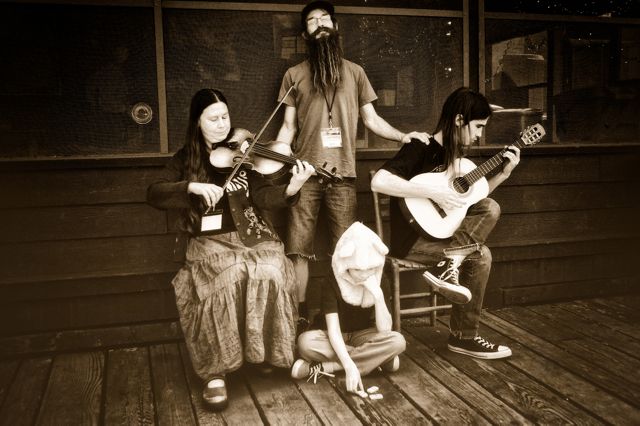 Poet Ted Pope, standing in the center, performed at last year’s HAPPENING, with musical accompaniment from his family. Photo my Micah Mackenzie
Poet Ted Pope, standing in the center, performed at last year’s HAPPENING, with musical accompaniment from his family. Photo my Micah Mackenzie
Chaos and order
Here’s a modern application of creative thinking: As a student, artist Jeff Marley (who lives on the Qualla Boundary in Cherokee) struggled to express his identity without falling into stereotypes. He began exploring that conflict through the Booger Dance, a traditional Cherokee ritual in which the dancer wears a gourd mask to take on the character of a trickster. Marley will perform the ritual at the HAPPENING. In one performance in Vermont, Marley dealt a card game to audience members, inspired, he says, by his previous work at the Cherokee casino. He used handmade, raku-fired chips, both for their distinct sound and for the way they (like the plastic chips at the casino) have value only in the context of the game.
Marley holds a bachelor’s degree in fine art from Western Carolina University, where, he says, “In our museum, our featured piece is a Kenneth Noland.” The color-field painter attended Black Mountain College from 1946-48. Marley says he heard a lot of talk about the influential school when he was getting his master’s at the Vermont College of Fine Arts.
Those out-of-the-box ideas sparked Marley’s own work. A recent Booger Dance performance at the University of North Georgia in Dahlonega, where he’s a visiting artist, involved sprinkling corn on the historical marker of a former U.S. Mint building. “The Booger’s saying, ‘Here’s the gold that you wanted, but I’m going to hide this gold to perpetuate this myth that the Indians hid the gold, and you have to dig up the mountainside to get it,’” Marley explains. “The Booger creates chaos, and from that chaos comes new order.”
Decolonization, a central theme in Marley’s work, is “about embracing a more genuine version of your culture, but doing so in a way that embraces other cultures,” he says. “It brings in the community and is rooted in your community. It helps the community heal and brings more pride and dignity back to the culture you’re focusing on,” whichever one that is.
Wearing the Booger mask, says Marley, makes him more observant. In performance, he works from a loose script, but his goal, he says, is for “something I don’t expect to happen, and I’ll have to respond to it on the fly.”
The mask, he says, has another purpose too: It “acts as an amplifier of a culturally based identity.” There’s an idea that a masked person has something to hide — “You don’t know who I am, so I can do stuff that normally I’d be a little more reserved about.”
Unlike traditional Booger masks, Marley’s is unadorned. “Part of what I’m saying is that, as a Cherokee person, I’m now the foreigner,” he says. “But also, I could be anybody. I don’t have to be any particular race or culture: I could be a reflection of anything.”
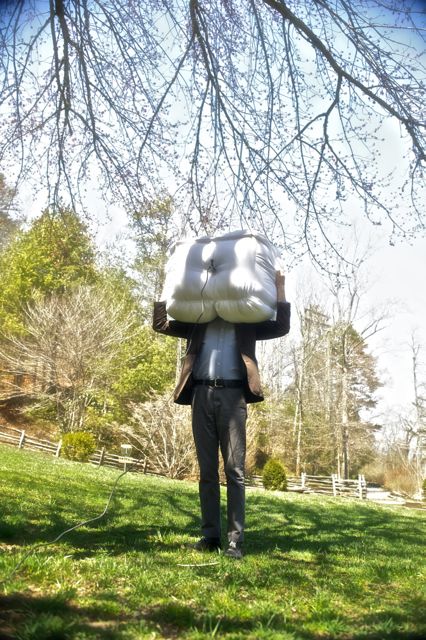 In Severn Eaton’s installation, from 2013, participants stepped into suspended headcovers that allowed them to anonymously contribute to an evolving vocal soundscape. Photo by Micah Mackenzie
In Severn Eaton’s installation, from 2013, participants stepped into suspended headcovers that allowed them to anonymously contribute to an evolving vocal soundscape. Photo by Micah Mackenzie
Distance learning
Writer and musician Jonathan Creasy, another of the 80-plus artists who’ll take part in the [Re] HAPPENING, knows something about adventurous art. Growing up in Los Angeles, he studied jazz with the likes of Peter Erskine and Charlie Haden. But an interest in Irish literature led him to Trinity College in Dublin, where he immersed himself in James Joyce’s work.
Creasy’s focus shifted as he began working on his doctorate. Still, “I continue to try to bring the music and the writing and the research together whenever possible,” he says. He founded and runs nonprofit publishing house/performance initiative New Dublin Press, which strives to juxtapose literary theory, analysis and criticism.
Creasy’s doctoral research, which looks at poetics and pedagogy, began with the letters between Charles Olson (Black Mountain College’s final rector) and Robert Creeley (who taught at the school in 1954 and ’55). “Creeley went on to be an important poet and a formidable teacher, and both of those things interest me,” says Creasy. He discussed those themes in a talk titled “What’s Made & Measured: Black Mountain Poetics as Craft & Design” at last October’s [Re] VIEWING Black Mountain College conference.
While the move to Ireland was contradictory for an artist who’d assumed his work would either keep him in LA or take him to New York City, Creasy says he immediately felt at home in Dublin in a way he never had in California. Counterintuitively, he says, “I’ve gotten a little bit more comfortable with being American in the last couple of years.” Meanwhile, Creasy’s focus has returned to American literature, including the Black Mountain College writers.
For the [Re] HAPPENING, “It’s really about form, about making something out of the subject at hand,” says Creasy. His writing is based on what he imagines the Black Mountain College experience was like. It also deals with the recent death of his mother and with the work of college alum John Cage. As a musician, “I’d always been aware of his work,” says Creasy. “I think he might embody and sort of enact a lot of the things that Black Mountain College stands for, even more so than a lot of the people who were there for more time.”
Creasy is part of a group of artists whose collective [Re] HAPPENING project will include a sound installation and other elements that won’t be determined until the 11th hour. Although group members have been in contact, they’ve yet to all be on the same continent, let alone in the same room. “We’ll meet each other the day before and be expected to create something the following day,” he says. But Creasy is an artist connected to particular places — LA, New York and Dublin — so naturally, Lake Eden will also play an important role in the performance. “The space is really the first thing we’re thinking about,” he says, “and the idea of art being created out of that and for that.”
WHAT: [Re] HAPPENING 2014
WHERE: Lake Eden in Black Mountain, rehappening.com
WHEN: Saturday, April 5. Dinner and performances begin at 6 p.m.,
$85 BMCM+AC members/$100 non-members.
Performances only, at 7:30 p.m., $25/$30. Round-trip trolly fare is $8



![Out of bounds: Adventurous art at [Re] HAPPENING 2014-attachment0](https://mountainx.com/wp-content/uploads/2014/04/Jeff_Marley.jpg)
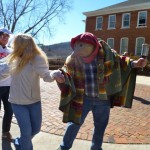
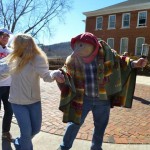

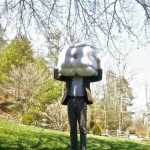
Before you comment
The comments section is here to provide a platform for civil dialogue on the issues we face together as a local community. Xpress is committed to offering this platform for all voices, but when the tone of the discussion gets nasty or strays off topic, we believe many people choose not to participate. Xpress editors are determined to moderate comments to ensure a constructive interchange is maintained. All comments judged not to be in keeping with the spirit of civil discourse will be removed and repeat violators will be banned. See here for our terms of service. Thank you for being part of this effort to promote respectful discussion.